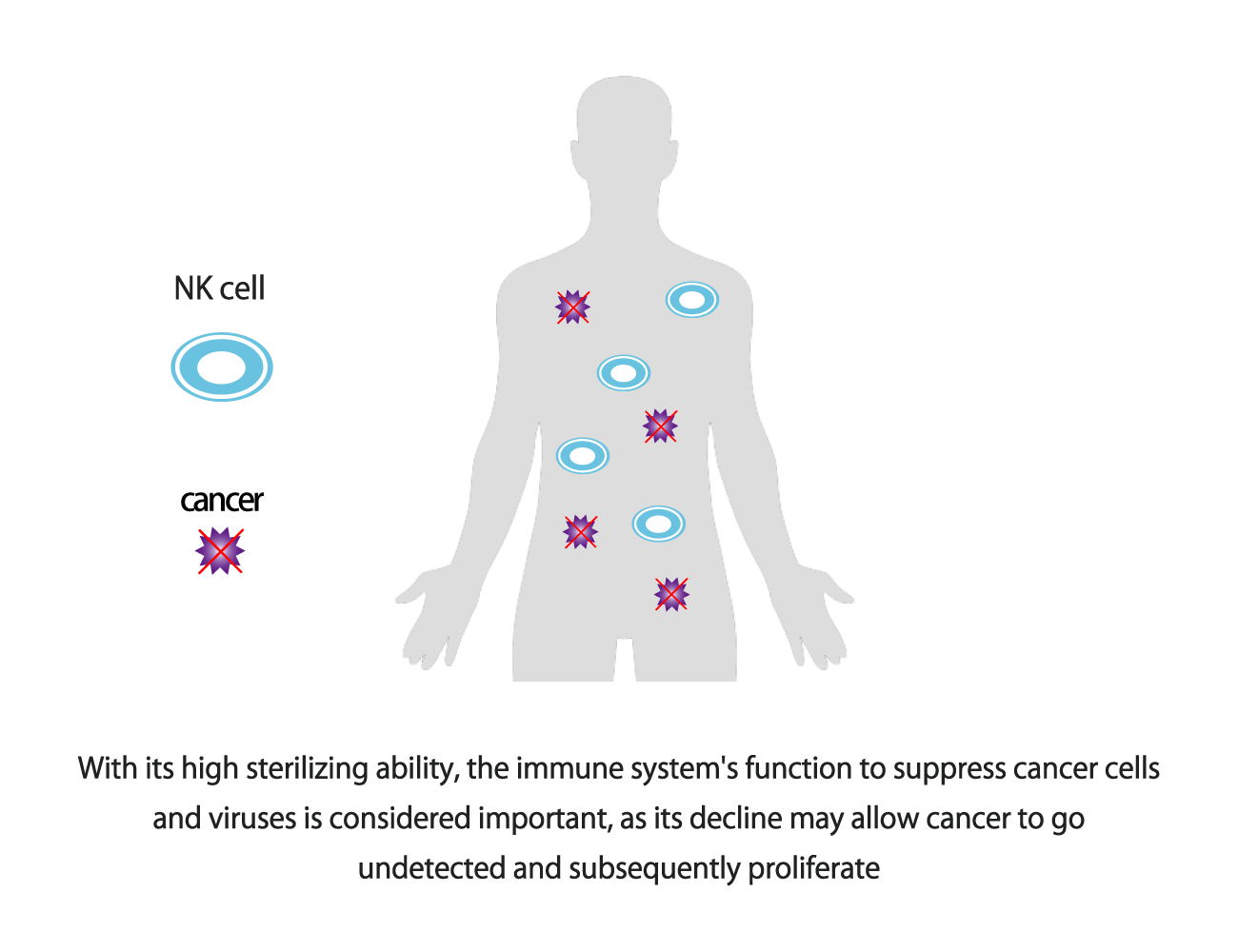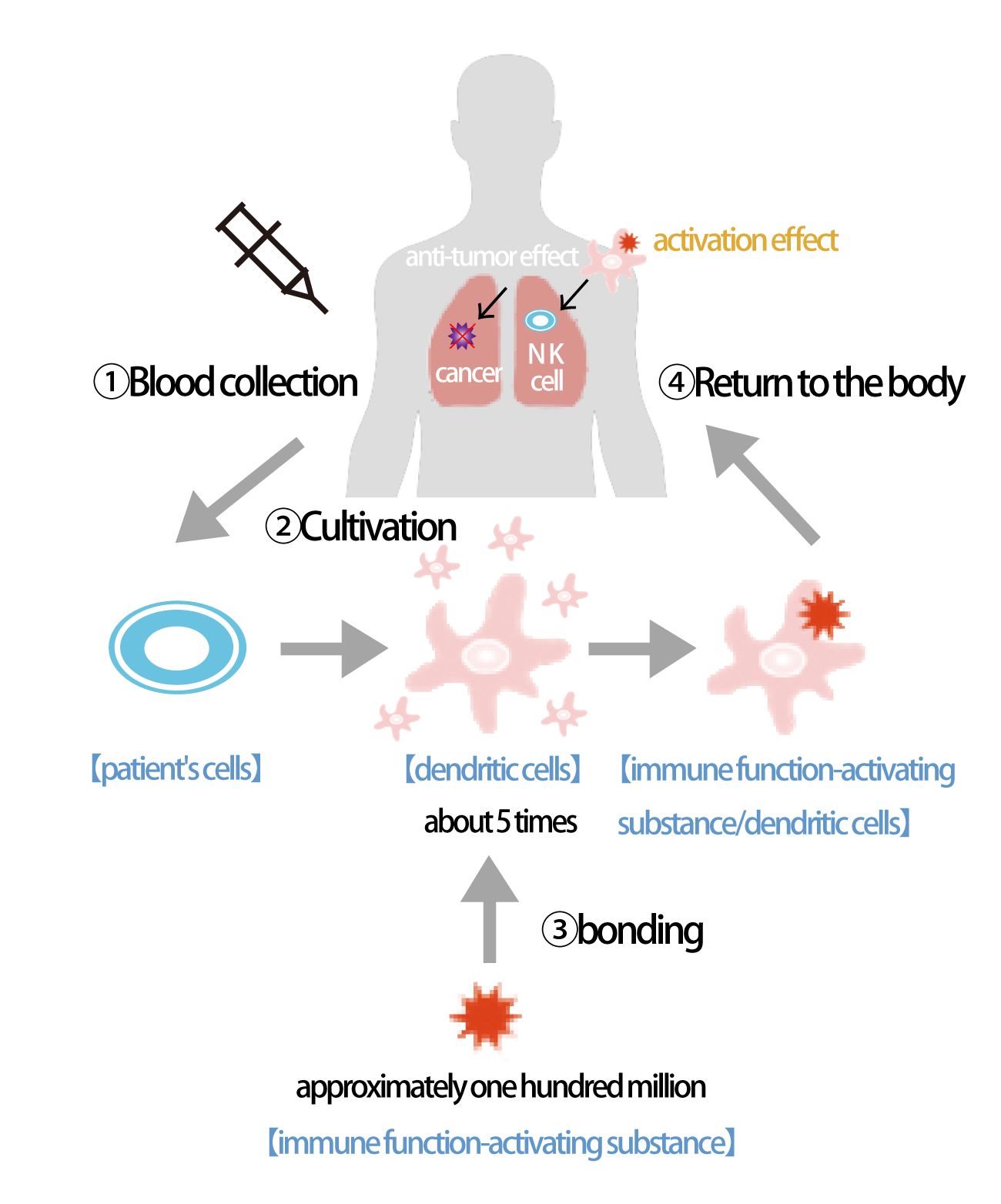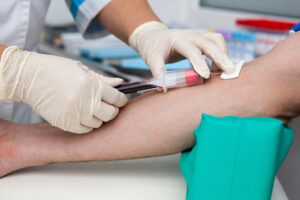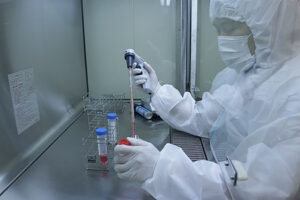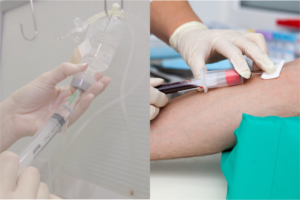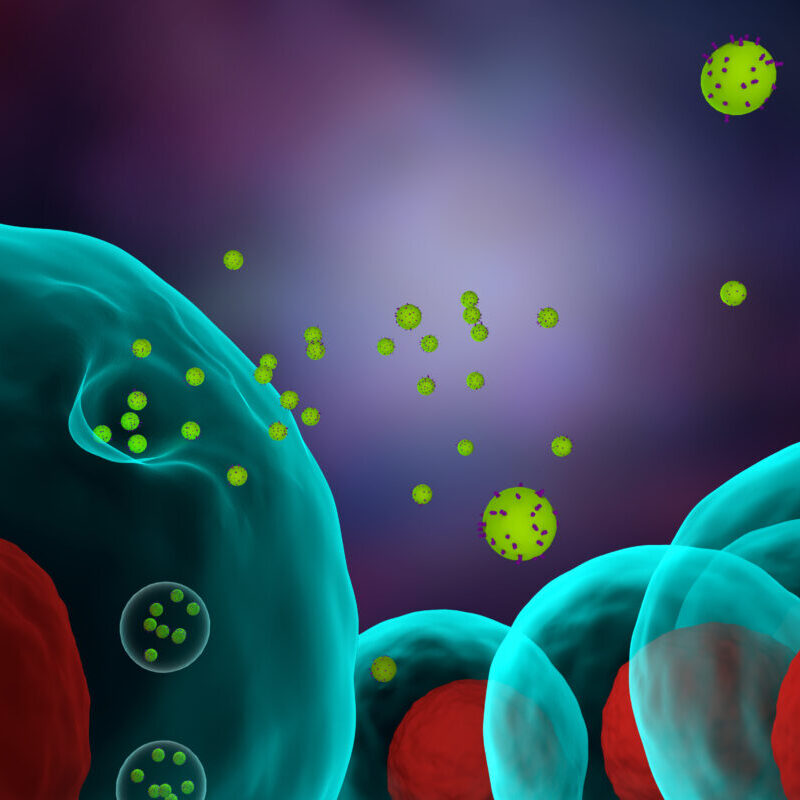What are NK cells?
NK cells are a type of immune cell that play a central role in the innate immune system. The immune system’s functions can be categorized into the immediate elimination of foreign invaders known as “innate immunity” and the production of specific antibodies to combat foreign invaders known as “adaptive immunity.” NK cells constantly patrol the body and, upon detecting an invasion by foreign invaders, immediately launch an attack. They directly attack cancer cells, infected cells, and other threats. The human body’s cancer-suppressing mechanisms can be divided into those that operate within cells, centered around “cancer-suppressing genes,” and those that function outside of cells, involving the actions of “immune cells.” Even in healthy individuals, it is estimated that 3,000 to 6,000 cancer cells are generated in the body every day. This occurs when cancer-suppressing genes fail to function properly, allowing the development of cancerous cells within the body. However, immune cells are responsible for effectively eliminating these cancer cells, preventing them from being left unchecked in the body. NK cells are at the forefront of this immune response. The immune system’s decline in function can lead to missed opportunities to eliminate cancer cells, allowing them to proliferate. The role that the immune system plays in cancer prevention is significant.
NK cell therapy involves taking NK cells from the patient’s blood, highly activating them through cultivation, and then returning them to the patient’s body via intravenous drip to target and combat cancer.
What is NK Cell Therapy?
NK cells have the ability to directly attack and destroy cancer cells. Cancer cells that have grown to the point of being diagnosed with cancer are typically resilient cells that have evaded repeated immune attacks and undergone repeated proliferation. They often possess strong characteristics that allow them to evade or neutralize immune attacks. Traditional immune responses are usually insufficient to completely eliminate these well-established cancer cells. Immune-based cancer therapies aim to enhance the immune system artificially to combat cancer cells. Among these, NK cell therapy primarily involves the high activation and cultivation of NK cells from the patient’s own blood, which are then reintroduced into the body via intravenous infusion to combat cancer. Since the therapy utilizes the patient’s own immune cells, it typically has fewer side effects. Additionally, NK cells, among the various immune cells, exhibit a high capacity to destroy cancer cells, making them effective against cancer in a relatively short period.
Expected Effects of NK Cell Therapy
- Shrinking or Inhibiting Cancer Growth: NK cells, when activated, can directly and indirectly kill cancer cells, leading to a reduction in tumor size or the suppression of cancer progression.
- Immune Enhancement: NK cell therapy can boost the immune system’s response, particularly in cases where cancer patients have reduced immune function due to immunosuppression from chemotherapy. It can also serve as a preventive measure against cancer development and recurrence.
- Combination Therapy: NK cell therapy has demonstrated its effectiveness in combination with various cancer treatments.
NK cells achieve cancer cell destruction through the action of various substances, including:
- Cytolytic Proteins (Perforin, Granzyme)
- Ligands: FasL, TRAIL
These substances play a crucial role in killing cancer cells.
Recommended for individuals in the following situations
- Patients seeking cancer treatment with minimal side effects.
- Patients with advanced or refractory cancers.
- Patients with compromised immune systems due to chemotherapy or radiation therapy.
- Patients looking to combine NK cell therapy with gene therapy for synergistic effects.
- Individuals aiming to prevent cancer recurrence and metastasis.
※In cases where surgery may lead to the spread of cancer cells throughout the body via blood or lymph, NK cell therapy is considered effective in preventing cancer cell proliferation. It is also characterized by its long-lasting effects when effective.
Key Points of the Procedure
・It is possible to maintain a high quality of life (QOL) with a sustainable and manageable treatment that does not impose significant physical or mental burdens. Since the treatment allows for outpatient care, your daily routine can remain largely unchanged. There is minimal physical exertion, and you can continue with your regular activities while undergoing treatment.
Applicable Cancers
Colorectal cancer, pancreatic cancer, esophageal cancer, stomach cancer, liver cancer, kidney cancer, bile duct cancer, bladder cancer, prostate cancer, thyroid cancer, melanoma, lung cancer, breast cancer, uterine body cancer, cervical cancer, ovarian cancer, oral cancer, pharyngeal cancer, brain tumors, and more.
Procedure Process
STEP I

Counseling
During the consultation with the doctor, we will listen to your concerns about your body and skin. Please feel free to ask any questions or express any uncertainties you may have.
STEP Ⅱ
Blood Collection
In regular blood donation, around 400cc of blood is collected. However, for this treatment, we collect a smaller amount of blood, typically between 30cc to 50cc.
STEP Ⅲ
Infection Testing
We conduct infection testing necessary for cell culture. Typically, if possible, we will perform the blood collection on the same day as your initial visit. It may take approximately one week to receive the test results.
The cells will be cultivated and activated for 2 to 3 weeks in the cultivation facility.
STEP Ⅲ
If multiple sessions are required, steps 2 to 4 will be repeated. The results of the treatment will be communicated after completing one set.
STEP Ⅳ

Consultation
After the administration is completed and the results are available, a consultation will be conducted. Based on the evaluation of the treatment, we will discuss the next steps.
Difference between NKT Cell-Targeted Therapy and NK Cell Therapy
- NKT Cell-Targeted Therapy
- NK Cell Therapy
Precautions
※Please note that the following individuals are not eligible for the treatment and should be aware of this in advance
- In the case of malignant lymphoma, there are some exceptions depending on the type. Please be sure to inform our clinic staff before starting treatment. It is possible to treat B-cell lymphomas.
- Leukemia is not eligible for treatment.
■Side Effects
- Since NK cells are cultured and activated from your own blood, the risk of rejection reactions or allergic reactions is minimal. However, approximately 10% of patients may experience symptoms such as fever. These symptoms typically resolve naturally within 24 to 48 hours and can be managed with over-the-counter fever-reducing medications.
- If you have a history of rheumatoid arthritis, connective tissue diseases, or autoimmune diseases, there is a risk of exacerbation of your condition.
- If you currently have interstitial pneumonia, there may be a risk of worsening the condition, which could be life-threatening, and high-activity NK cell therapy may not be possible.
- In the case of viral hepatitis, especially severe hepatitis B, there is a possibility of symptom exacerbation and worsening to a life-threatening condition due to immune activation. Please note that there is a potential risk.
■Combination with Immune Checkpoint Inhibitors
・If you plan to use immune checkpoint inhibitors in combination with this treatment, you must obtain the approval and supervision of your primary physician. There have been reported cases of severe side effects. If you choose to use them in combination, please understand the associated risks, including the possibility of discontinuing treatment midway.
Q&A
Q: Are there differences in effectiveness depending on the location of the cancer? A: There are no significant differences in effectiveness based on the location of the cancer. The most critical factor is the condition of the patient’s immune cells. If the immune cells are in good condition, treatment effectiveness can be expected, but if they are in poor condition, it may take time for the treatment to show results.
Q: Is it possible to combine this treatment with other therapies? A: There are no issues with combining this treatment with others. It is also believed to help reduce the side effects of other treatments. However, when combining it with chemotherapy or radiation therapy, the timing of both treatments needs to be considered.
Q: Can this treatment be used in conjunction with chemotherapy or radiation therapy? A: Yes, it is possible. However, chemotherapy and radiation therapy can damage not only cancer cells but also normal cells, including immune cells. Therefore, blood collection for NK cell therapy should be done 2-3 days after chemotherapy. If you plan to combine these treatments, please consult with your primary physician and our clinic.
Q: Chemotherapy and other treatments have strong side effects, and I would prefer not to undergo them. Is it possible to treat only with high-activity NK cell therapy? A: High-activity NK cell therapy has shown therapeutic effects even in cases where surgery, chemotherapy, and radiation therapy were unsuccessful in halting the progression of the disease. Therefore, it is possible that high-activity NK cell therapy alone can be a treatment option. However, high-activity NK cell therapy does not interfere with chemotherapy or other treatments, so combining it with these treatments may enhance the overall therapeutic effect.
Q: My cancer has metastasized. Can this treatment still be effective? A: Yes, it can still be effective. However, in severe cases where cancer has spread throughout the body, the expected effectiveness may be limited.
Q: Can early-stage cancer be treated with this therapy? A: Yes, even in the early stages of cancer, it can be beneficial to use high-activity NK cell therapy in combination with chemotherapy or after completing chemotherapy.
Q: I am considering this treatment for preventing recurrence. Is it effective? A: It is believed to be effective for preventing recurrence. In recent years, more and more people have been receiving this treatment for the purpose of preventing recurrence.
Q: Are there age-related or physical limitations for receiving this treatment? A: There are no limitations based on age or physical condition. High-activity NK cell therapy does not impose a burden on the patient’s body, so it can be received without age or physical limitations.

